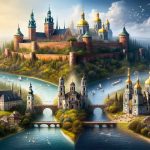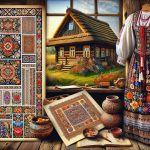
Diving into Polish literature is like opening a book on the history and heart of Poland itself. This journey takes us from the early days, through a golden era of poetry, to stories about war and resistance, and then into a literary revolution after the war.
Polish books share a wide range of themes and stories. By reading them, we not only learn about Poland’s changing identity but also about shared human experiences across the world.
So, what discoveries and insights can we look forward to as we delve into Poland’s literary world?
The Roots of Polish Literature
Polish literature has deep roots in the country’s vibrant yet challenging history and cultural traditions, providing a fascinating window into its evolving identity. It all began in the Middle Ages, when the first known Polish texts were written in Latin, showing how Poland was part of the broader Christian European tradition. However, a pivotal moment came when writers started using the Polish language. This move wasn’t just about language; it was a bold statement of national pride and consciousness at a time when such concepts were gaining ground across Europe.
One of the earliest and most significant Polish texts is the ‘Bogurodzica,’ a hymn that not only has spiritual value but also marks a key point in the development of Polish literature by using the vernacular language. This shift to Polish was crucial. It meant that literature could now reach a wider audience, not just the educated elite but also the common people, making it a powerful tool for shaping national identity.
As Poland navigated through periods of conflict and change, its literature reflected and often critiqued these experiences. The Renaissance, for example, was a golden age for Polish literature, bringing to the fore writers like Jan Kochanowski, whose works are considered masterpieces and pivotal to the Polish literary canon. Kochanowski’s ‘Laments’ is a profound exploration of human emotion and loss, offering insights into the human condition that remain relevant today.
In more recent history, during the partitions of Poland in the 19th century, literature became a form of resistance against the oppressors. Poets like Adam Mickiewicz and Juliusz Słowacki used their works to inspire hope and national unity. Mickiewicz’s ‘Pan Tadeusz,’ for instance, is not just an epic poem; it’s a rallying cry for Poles, emphasizing the importance of their homeland and culture at a time when Poland didn’t exist on the map.
Polish literature continues to evolve, with contemporary authors like Olga Tokarczuk, who won the Nobel Prize in Literature in 2019, exploring themes of identity, history, and morality in innovative ways. Her novel ‘Flights’ is a brilliant example of how Polish literature is not just about Poland’s past but is also a dynamic part of global conversations on human experience and creativity.
The Golden Age of Poetry
The Renaissance was a standout era for Polish poetry, marking what many consider the Golden Age of this art form in Poland. This period was notable for its significant intellectual and artistic achievements, leading to a vibrant and diverse flowering of Polish poetry. The merging of European Renaissance humanism with Poland’s distinct cultural identity led to a surge in literary creativity. This creativity was both innovative and deeply connected to Polish life.
One key figure during this time was Jan Kochanowski, often hailed as the father of Polish literature. He was instrumental in bringing classical styles into conversation with contemporary issues. This approach not only helped to shape the modern Polish language but also laid the groundwork for future literary developments. Kochanowski and his contemporaries managed to express themselves in ways that were eloquent and rich in metaphors, often tackling universal themes related to humanism. This approach to poetry had a lasting impact on Polish literature, embedding itself deeply within the nation’s cultural memory.
For example, Kochanowski’s ‘Laments,’ a series of nineteen elegies, mourns the death of his daughter in a manner that combines personal grief with broader philosophical reflections. This work exemplifies the era’s hallmark of blending emotional depth with intellectual exploration. It’s a testament to how Renaissance poets in Poland were not only reflecting on their immediate surroundings but were also engaging with the larger human condition.
The Renaissance period in Poland, therefore, wasn’t just a time of great literary output; it was a moment when Polish poetry truly came into its own. By integrating European influences with local traditions, Polish poets of the Renaissance laid the foundation for a literary tradition that continues to thrive today. Their work demonstrates the power of poetry to explore complex ideas and emotions, making it an enduring source of inspiration and reflection.
War and Resistance Narratives
Polish literature is rich with stories of war and resistance, telling tales of the country’s challenging history and the resilience of its people. These stories are not just about battles and historical events; they focus on the deep psychological and social effects of war. They show us the strength people can muster in the face of tyranny.
For example, Tadeusz Borowski’s collection, ‘This Way for the Gas, Ladies and Gentlemen,’ provides a chilling look into the experiences of Holocaust victims. Similarly, Zofia Nałkowska’s ‘Medallions’ delves into the moral dilemmas and human suffering during World War II. These authors offer more than just stories; they present a deep understanding of humanity’s struggles and triumphs during some of the darkest times.
These narratives are important because they help us understand the impact of war beyond the battlefield. They explore how conflict reshapes societies, influences cultures, and changes the course of individual lives. By bringing us close to the personal experiences of those who lived through these times, these stories make history relatable and real. They remind us of the cost of freedom and the price of silence in the face of injustice.
In a world where history can sometimes seem distant, these narratives from Polish literature serve as a powerful reminder of the resilience of the human spirit. They encourage us to remember the past, not just as a series of events but as a collection of human experiences that have shaped our world. Whether you’re a history buff, a literature enthusiast, or someone looking to understand more about the human condition, delving into these works can offer profound insights and a deeper appreciation for the strength and resilience that define us.
Post-War Literary Revolution
After World War II, Poland saw a remarkable transformation in its literary scene. This period wasn’t just about rebuilding what was lost; it was also about reimagining the role of literature in society. Writers like Czesław Miłosz and Zbigniew Herbert played a critical role in this change. They didn’t just recount the horrors of war. Instead, they delved into the big questions of existence and morality that surfaced in its wake.
For example, Miłosz’s work often tackled the challenge of maintaining one’s humanity and integrity in the face of oppressive regimes. Herbert, on the other hand, was known for his reflections on history and personal responsibility. Their writing was innovative, not just in the themes they explored but also in how they presented them. They adopted new styles and techniques, such as modernism and the avant-garde, to better capture the complex reality of their time.
This shift wasn’t just about moving away from older literary styles. It was a profound exploration of what it means to be human in a world that had seen so much destruction. These writers showed that literature could be a powerful tool for examining the past and imagining a different future. Their works serve as a reminder of the resilience and creativity of the human spirit, even in the darkest times.
In a nutshell, post-war Polish literature was not merely a response to the war; it was a bold step into new territories of expression and thought. Through their inventive use of language and form, writers like Miłosz and Herbert invited readers to join them in a journey of reflection and discovery. This era of Polish literature not only enriched the country’s cultural heritage but also offered insights that resonate with readers around the world, regardless of their background.
Contemporary Voices and Themes
Polish literature today is vibrant and diverse, reflecting the country’s changing social, political, and cultural landscapes. Authors are tackling a wide variety of themes, making their stories more relatable to a global audience. One major theme is identity, exploring what it means to be Polish in the modern world. Migration is another hot topic, with stories often highlighting the challenges and opportunities that come with moving to a new place.
The impact of historical events, especially World War II and the Communist era, is still very much alive in Polish literature. Writers are finding new ways to talk about these periods, focusing on personal and collective memories. This approach helps readers understand the deep scars these events left on the country and its people. For example, books like ‘The Books of Jacob’ by Olga Tokarczuk dive deep into Poland’s past to bring these discussions to life.
Contemporary Polish authors are not shy about mixing the personal with the political. They challenge national myths and encourage readers to think differently about Poland’s collective memory. This is important because it opens up conversations about where Poland is headed in the future.
In a nutshell, Polish literature is more than just stories. It’s a lens through which we can view and understand the complex identity of Poland and its people. Whether you’re interested in the impact of migration, the shadows of history, or the personal tales that weave into the larger national fabric, there’s a wealth of Polish books waiting to be discovered.
Conclusion
Polish literature is like a journey through the country’s rich history and its changing culture. Starting with ancient stories, moving through a period where poetry shined, to tales of war and fighting for freedom, and then to a time after the war where writers started to experiment and break new ground, Polish books have always managed to stay fresh and relevant.
They talk about things that matter not just in Poland, but all over the world. Today, Polish writers are still at it, coming up with new stories that make us think and feel, keeping Poland’s tradition of great writing alive and well in the big, wide world of books.






Comments are closed.